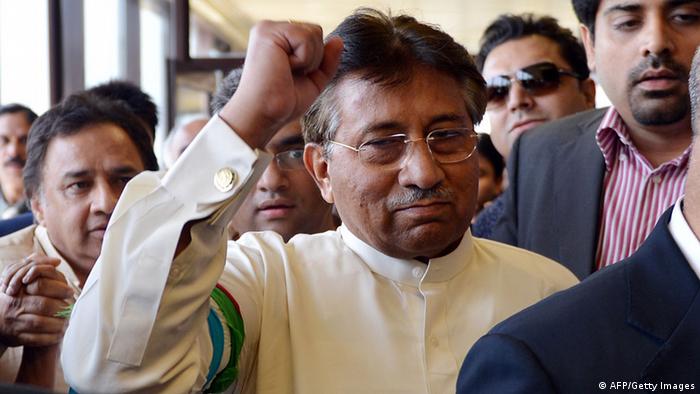Our Announcements
Sorry, but you are looking for something that isn't here.
The Musharraf Drama
Musharraf-bashing is all a charade, a part of a bigger game, to distract the nation from the pathetic performance of the govt while the media is hand in glove with the govt in this charade.
The PPP-Jiyala govt (with media support) squandered / wasted their five-year term observing barsies (death anniversaries).
This PMLN-Mutwala govt (with media support) will spend their five your term pressing cases against Musharraf who is a dead horse.
In the end, the nation will be ten years behind and the Ghareeb Awaam will be poorer than ever while we keep bickering about Mush while the issues like law & order, unemployment, galloping inflation, cost of living etc all remain conveniently buried and untouched by the media + the intelligentsia.
For eff’s sake, Mush is dead and gone; bury him. There are other more burning issues. The average man on the street does not give a damn whether it is a democrat who rules the the country or a dictator. All the average man on the street wants is two square meals a day and a secure job. In fact I personally don’t give a damn. If you ask me I would vote for the entity that would stem the rot, root out corruption and nip the evil in the bud; I will vote for even the Taalibaan if they can bring this about.
M.A.K
Posted by admin in Nawaz "Badami Lassi Kim Barker Thurke" Sharif, Nawaz 's Dauphin, Nawaz Dangerous, Nawaz Sharif & Kashmiri Biradari, NAWAZ SHARIF THIEF, NAWAZ SHARIF US & SAUDI AGENT, Nawaz Sharif US Agent, NAWAZ SHARIF US CIA ASSET IN PAKISTAN, Nawaz Sharif-The Prime Minister from Hell on May 6th, 2014
Anti-Pakistan Army Nawaz, Nawaz League is Narendra Modi League, Pakistan Army Hater Nawaz Sharif
Posted by admin in " RIAZ THE SHAITAN OF PAKISTAN, Nawaz "Badami Lassi Kim Barker Thurke" Sharif, Nawaz 's Dauphin, Nawaz Dangerous, Nawaz Sharif & Kashmiri Biradari, NAWAZ SHARIF FAMILY TURPITUDE, NAWAZ SHARIF LOAN SCAM, Nawaz Sharif Massive Corruption, NAWAZ SHARIF MUZZLES PRESS, NAWAZ SHARIF SAGA OF ABSOLUTE & CHRONIC CORRUPTION, Nawaz Sharif-The Prime Minister from Hell, NAWAZ SHARIF: THE LOOTER, Nawaz US Agent, The New Face of Economic Hitmen on May 6th, 2014
COMMENTS BY PAKISTAN THINK TANK MEMBERS ARE SHOWN IN BLUE
“WE ALL ARE COWARDS AND BUNCH OF IDIOTS THINKING THAT PML-N GOVERNMENT IS MAKING FANTASTIC ECONOMIC PROGRESS UNDER THE LEADERSHIP OF OUR MOST TALENTED FINANCE MINISTER, ISHAQ DAR”

The writer is a columnist based in Islamabad. Email: farrukh15@hotmail.com
ALL THOSE TRYING TO TELL PEOPLE OF PAKISTAN THAT PML-N GOVERNMENT IS MAKING FANTASTIC ECONOMIC PROGRESS UNDER THE LEADERSHIP OF OUR MOST CORRUPT FINANCE MINISTER, ISHAQ DAR, AND BONGA PRIME MINISTER ARE COWARDS AND BUNCH OF IDIOTS THINKING THAT COUNTRY WILL MAKE PROGRESS BY BEGGING MONEY OR RECEIVING CHARITY FROM DIFFERENT CHANNELS, RATHER IT ESTABLISHES THAT PAKISTAN IS A BEGGING STATE
Cronies Based PMLN Economic Team, Economic Incompetence of Nawaz Sharif, IPPs, Power Crisis is Killing Pakistanis, Recipe for Economic Disaster, The Economic Hit Men of West
Posted by admin in Nawaz "Badami Lassi Kim Barker Thurke" Sharif, Nawaz 's Dauphin, Nawaz Dangerous, Nawaz Sharif & Kashmiri Biradari, Nawaz Sharif Dangerous Man, NAWAZ SHARIF DICTATOR, NAWAZ SHARIF FAMILY TURPITUDE, NAWAZ SHARIF THIEF, NAWAZ SHARIF US & SAUDI AGENT, NAWAZ SHARIF US CIA ASSET IN PAKISTAN on April 30th, 2014

 Islamabad diary
Islamabad diary
Power Drunk Control Freak Nawaz Sharif is a Kughoo.He never learns from his past mistakes and continues to repeat them.He is not too bright in the hard drive in his head. Or he does not know how to use it, because,he lacks critical thinking skills and Emotional Intelligence which goes with it
Nawaz Sharif at loggerheads with the army again, the old pattern of 1999 repeating itself. Cruel destiny…is Pakistan doomed to walk the paths it has trodden before? What is at work here… the army’s overweening ambition or PM Sharif incurable?
Bewildered and Confused Nawaz Sharif, Power Drunk Control Freak Nawaz Sharif
Posted by admin in Nawaz 's Dauphin, Nawaz Dangerous, Nawaz Sharif & Kashmiri Biradari, Nawaz Sharif Dangerous Man, NAWAZ SHARIF DICTATOR, NAWAZ SHARIF FAMILY TURPITUDE, NAWAZ SHARIF LOAN SCAM, Nawaz Sharif Massive Corruption, Nawaz Sharif US Agent, NAWAZ SHARIF US CIA ASSET IN PAKISTAN, Nawaz Sharif Womanizer on April 28th, 2014

NAWAZ SHARIF PASSED STATE SECRETS TO INDIA
